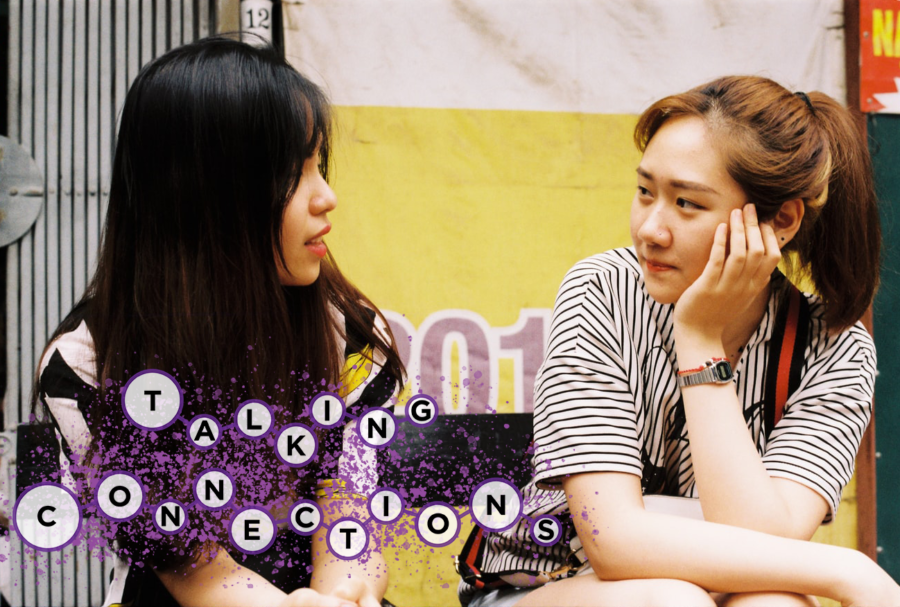Talking Connections: Empathetic responses can reduce the stress loads of loved ones
Stress can cause conflict in relationships, stirring up unnecessary arguments, but communicating and self-care can help lessen the stress.
April 16, 2020
Editor’s note: This is part nine in our weekly relationship series “Talking Connections.” Sensitive content may follow.
College notoriously piles work and financial stress on students as professors prepare them to become seasoned professionals.
With four months to cover material, many frequently suffer the experience of five deadlines in the same week.
Relationships — platonic, romantic or familial — can serve as a crutch in such situations, but it is this proximity that can cause problems.
Stress responses frequently leak into relationships causing people to erupt or distance themselves, and experts recommend practicing empathy and understanding to resolve the situation more quickly.
Amie M. Gordon, a social-personality psychologist, regularly examines how people can improve their relationships and explores different ways people exude their stress in “Is Stress Killing Your Relationship? Why You’re Not Alone” in Psychology Today.
Gordon mentions some common examples of how people will release stress onto others including irritability, lashing out or distancing oneself.
“When people are stressed, they become more withdrawn and distracted, and less affectionate,” Gordon said in the article. “They also have less time for leisure activities, which leads to alienation between partners.”
Bringing external stressors into a relationship can cause a simple argument about the dishes to escalate to how one partner fails the other. While the underlying agitation may be an upcoming chemistry exam, many struggle to relate the stress caused by ill-preparedness for the test to the unwashed dishes.
Carolyn Cutrona, associate dean of the Graduate College, said acting out in frustration against someone in times of stress is neither uncommon nor absurd.
“Sometimes, we just act the way we feel,” Cutrona said. “We don’t stop to think if it is fair to act this way. We’re just frustrated. Our fuses are just shorter.”
Underlying stress contributes to people lashing out at another, and if it is an irregular behavior, it does not always justify extreme measures.
If an argument ensues as a consequence of stress, Cutrona recommends leaving the situation to collect thoughts and relax, whether that be going for a walk, getting exercise, meditating or deep breathing to build accommodation.
“So your partner snaps at you, you don’t snap back,” Cutrona said. “You go for a walk. Don’t ignore serious abuse, but you can ignore the little stuff. Sometimes you can even avoid the little stuff.”
Trying to remain calm in heated moments could help soothe the issue quicker and facilitate an apology later on as both parties have time to reflect on their actions.
Even with the best of intentions though, it can seem Herculean to offer an appropriate amount of comfort, especially if the one reconciling is already drained.
Fallyn Lee, staff psychologist with Student Counseling Services, recommends regularly reflecting on ones’ behavior to provide the best support possible to friends, partners and family members.
“In order to take care of and support others, you really gotta take care of yourself, so the old phrase ‘you can’t fill from an empty bucket’ really applies,” Lee said. “Make sure you’re in a really healthy place and that you’re doing things to take care of you, so that you are there in turn to help others.”
Self-reflection through journaling or mindfulness can help one identify areas of improvement and collect oneself when the world seems to spin too fast, and no one has to continue this journey alone.
Even those well-versed in self-care can sometimes experience difficulty recognizing the behaviors within oneself.
Communication serves as the base of practically every relationship, and Cutrona recommends befriending people who can provide honest feedback about negative behaviors.
“It’s useful to figure out why you’re doing things that are hurting other people,” Cutrona said. “It’s fine to reach out to a friend when things have gone quiet. Confiding and being there for each other when you can.”
Those closest could provide opportunities for realistic feedback and advice for how to become more mature when stressors ensue. Both Lee and Cutrona mentioned if informal support does not seem sufficient, counseling therapy for stress management is always an option for students.
Straining a relationship because of external stressors is natural. Coping with these stressors requires some trial and error, but verbalizing and listening to one another is a simple place to begin.
“Try to lead with compassion and understanding,” Lee said. “Try to approach things with curiosity instead of judgement.”

















